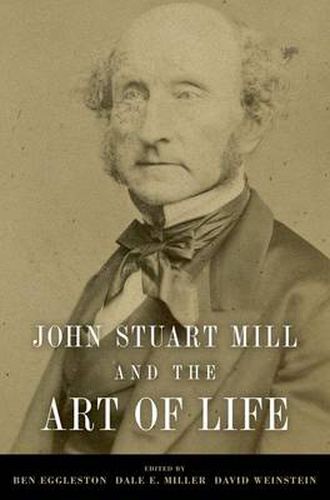Readings Newsletter
Become a Readings Member to make your shopping experience even easier.
Sign in or sign up for free!
You’re not far away from qualifying for FREE standard shipping within Australia
You’ve qualified for FREE standard shipping within Australia
The cart is loading…






The Art of Life is John Stuart Mill’s name for his account of practical reason. In this volume, eleven leading scholars elucidate this fundamental, but widely neglected, element of Mill’s thought. Mill divides the Art of Life into three departments : Morality, Prudence or Policy, and Aesthetics. In the volume’s first section, Rex Martin, David Weinstein, Ben Eggleston, and Dale E. Miller investigate the relation between the departments of morality and prudence. Their papers ask whether Mill is a rule utilitarian and, if so, whether his practical philosophy must be incoherent.The second section contains papers by Jonathan Riley and Wendy Donner, who explore the relation between the departments of morality and aesthetics. They discuss issues ranging from supererogation to aesthetic pleasure and humanity’s relationship with nature.The papers in the third section consider the Art of Life’s axiological first principle, the principle of utility. Elijah Millgram contends that Mill’s own life refutes his claim that the Art of Life has a single axiological first principle. Philip Kitcher maintains that Mill has a dynamic axiology requiring us to continually refine our conception of the good. In the final section, three papers address what it means to put the Art of Life into practice. Robert Haraldsson locates an ‘Art of Ethics’ in On Liberty that is in tension with the Art of Life. Nadia Urbinati plumbs the classical roots of Mill’s view of the good life. Finally, Colin Heydt develops Mill’s suggestion that we regard our own lives as works of art.
$9.00 standard shipping within Australia
FREE standard shipping within Australia for orders over $100.00
Express & International shipping calculated at checkout
The Art of Life is John Stuart Mill’s name for his account of practical reason. In this volume, eleven leading scholars elucidate this fundamental, but widely neglected, element of Mill’s thought. Mill divides the Art of Life into three departments : Morality, Prudence or Policy, and Aesthetics. In the volume’s first section, Rex Martin, David Weinstein, Ben Eggleston, and Dale E. Miller investigate the relation between the departments of morality and prudence. Their papers ask whether Mill is a rule utilitarian and, if so, whether his practical philosophy must be incoherent.The second section contains papers by Jonathan Riley and Wendy Donner, who explore the relation between the departments of morality and aesthetics. They discuss issues ranging from supererogation to aesthetic pleasure and humanity’s relationship with nature.The papers in the third section consider the Art of Life’s axiological first principle, the principle of utility. Elijah Millgram contends that Mill’s own life refutes his claim that the Art of Life has a single axiological first principle. Philip Kitcher maintains that Mill has a dynamic axiology requiring us to continually refine our conception of the good. In the final section, three papers address what it means to put the Art of Life into practice. Robert Haraldsson locates an ‘Art of Ethics’ in On Liberty that is in tension with the Art of Life. Nadia Urbinati plumbs the classical roots of Mill’s view of the good life. Finally, Colin Heydt develops Mill’s suggestion that we regard our own lives as works of art.